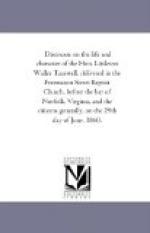grandson of the knight, and by the eloquent and accomplished
Henry Tazewell. Then it was usually bestowed
upon some prominent lawyer who had retired from the
bar, and within my recollection it has ever been held
by upright, intelligent, and honorable men. I
see this old man, too, with the freshness of the passing
hour, as he was driving out in his capacious chariot
to Lawson’s, or as he strolled or rather rocked
along the sidewalk. He was very large, weighing
between two and three hundred, and was nearly six
feet in height. He said he had no idea of his
bulk until, passing a negro woman in the street with
a basket on her head who took a side glance at him,
he heard her unconsciously exclaim: “Good
gracious, what a big white man!” He was born
in 1760, in Brunswick as Brunswick then was, was educated
at William and Mary, while Wythe was professor of law,
having as his college associates John Marshall, Spencer
Roane, the amiable and patriotic Samuel Hardy, who
was destined to fall too soon, and at whose grave
Virginia sat in mourning, Archibald Stuart, Bushrod
Washington, William Short, our Minister to Spain, et
alii haud impares: was one of the founders
of the Phi Beta Kappa Society—an institution
which will make his name immortal—and began
the practice of the law in his native county.
After the peace of 1783, he took up his abode in Portsmouth,
where he reached the head of the bar; and in the great
hegira from that town on the adoption of the federal
constitution in 1788, he came over to Norfolk, where
he had now long held the front rank in his profession.
He too had passed a noviciate in the Clerk’s
office, had studied law under the guidance of Wythe,
and had been very successful. Like Nimmo, he
was called the honest lawyer; and it was one of the
sly jests of our fathers that there should be two lawyers
at the same bar and in the same generation, whose
claims to the title should be generally conceded by
the people. In 1802 he had reached his forty-second
year; and having acquired a competent fortune—for
moderation was the order of those times—he
was soon to withdraw from the bar, and to fill the
chair of the Recorder. He is said to have been
very successful in making lawyers eloquent and entertaining
while he was on the bench. Whether he was fond
of the classics, I cannot affirm; but he certainly
borrowed a trait from Homer, and nodded occasionally;
and when a tedious speaker began his harangue, having
already taken a full view of the law and facts of
the case, he usually fell asleep, waking up as the
counsel finished his harangue, much refreshed at least,
if not instructed by it, and proceeded to give judgment
in the case. He was noted for his tenderness
to the poor, and it is said that he had on their account
almost as much business after he withdrew from the
bar as before. He died in 1820, at the age of
sixty, and was buried in St. Paul’s, within
a few feet of his compatriot Mathews. When Col.
Nivison, in December, 1776, was returning to his lodgings




